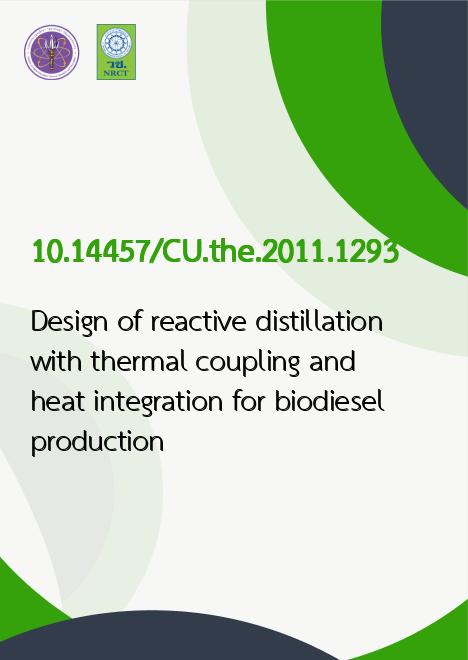
|
Design of reactive distillation with thermal coupling and heat integration for biodiesel production |
|---|---|
| รหัสดีโอไอ | |
| Title | Design of reactive distillation with thermal coupling and heat integration for biodiesel production |
| Creator | Porntida Chatsirisook |
| Contributor | Amornchai Arpornwichanop |
| Publisher | Chulalongkorn University |
| Publication Year | 2554 |
| Keyword | Biodiesel fuels, Distillation |
| Abstract | Biodiesel produced from agricultural resources becomes an important alternative diesel fuel. However, a major obstacle in biodiesel commercialization is its high production cost. To increase competitive ability of biodiesel, design of a biodiesel process in an effective way is required. The aim of this work is to design a reactive distillation based on the concepts of thermal coupling and heat integration for biodiesel production form esterification of fatty acid. The designed processes are the conventional reactive distillation (CRD), the stripper-thermally coupled reactive distillation (s-TCRD), the rectifier-thermally coupling reactive distillation (r-TCRD) and the heat integrated reactive distillation (HIRD). The performance of such processes in terms of the conversion of oleic acid and purity of methyl oleate (biodiesel product) is analyzed, using a process simulator, with respect to key parameters such as column pressure, feed temperature, reboiler heat duty, reaction stage and feed location. The designed processes can achieve the purities of biodiesel product and recycled methanol at 99 % and the conversion of oleic acid of 99 %. The total energy consumption of all the biodiesel processes is compared. It is found that the s-TCRD, r-TCRD and HIRD processes can reduce the energy consumption by 31%, 36.5% and 40%, respectively, compared with the CRD process. |
| URL Website | cuir.car.chula.ac.th |